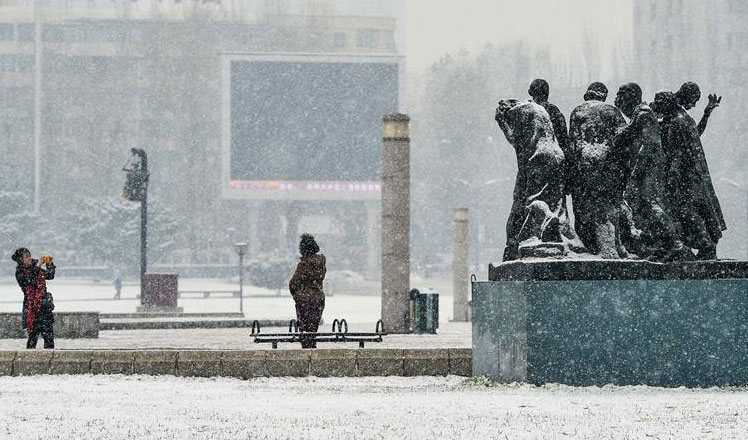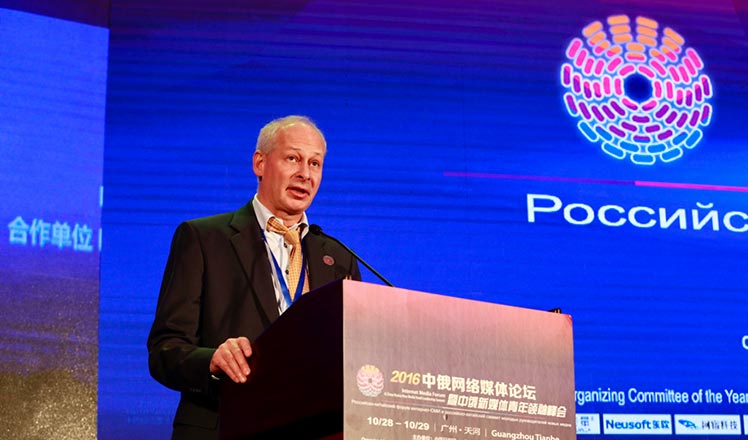Video provider calls for more collaboration in Sino-Russia TV industry
Updated: 2016-10-31 16:05
By Liu Zheng in Guangzhou(chinadaily.com.cn)
|
||||||||
 |
|
Kirill Philippov, director general of SPB TV, delivers a keynote speech during the China-Russia Internet Media Forum & China-Russia New Media Youth Leadership Summit held on October 29, 2016 in Tianhe district in Guangzhou.[Wang Chengmeng/chinadaily.com.cn] |
"The Belt and Road Initiatives can help in future development and collaboration between Russia and China in new media and online technologies." Kirill Philippov, director general of SPB TV, said during the China-Russia Internet Media Forum & China-Russia New Media Youth Leadership Summit held on Saturday in Tianhe district in Guangzhou.
Proposed by President Xi Jinping in 2013, the "One Belt One Road" refers to the Silk Road Economic Belt and the 21st Century Maritime Silk Road initiatives. The two initiatives aim to improve cooperation with countries in a vast part of Asia, Europe and Africa.
SPB TV, as the largest provider of end-to-end OTT TV, IPTV and mobile TV solutions in the Commonwealth of Independent States (CIS) region, started broadcasting content from China in 2013.
According to Philippov, with an existing user base that reaches more than 60 million around the globe, the company's newly-launched "One Belt One Road" OTT TV platform provides eleven live Chinese channels and on-demand video content for its audience.
 |
|
Kirill Philippov, director general of SPB TV, participates a media tour of the China-Russia Internet Media Forum & China-Russia New Media Youth Leadership Summit kicked off on October 28, 2016 in Tianhe district in Guangzhou.[Photo provided to chinadaily.com.cn] |
The past four years saw an increase in collaborations and cooperation agreements signed between the video platform and Chinese media outlets. Philippov said that the audience's preference for Chinese TV programs tends to increase rapidly, and the number of orders has increased five times in the past two years.
"Enhancing cooperation with Chinese media is one of the most important strategic development strategies for us and our technology ability allows us to be able to protect the safety of the content," said Philippov.
Alexey Volin, deputy minister of Telecom and Mass Communications of the Russian Federation, also said that both China and Russia are paying more attention to media development and media safety.
"Russia will hold a series of events during the 2016-2017 Sino-Russian Media Exchange Year, to further promote cooperation," Volin said. "We expect more media representatives to get involved in the events to discuss how to enhance internet security and improve the quality of internet content."
In September 18, 2015, China Economic Net VOD channel produced by China Economic Net was added to SPB TV's applications.
In June this year, Shanghai Media Group released new strategic projects with the company and Sony Pictures Entertainment for copyrights and global distribution of Chinese films and TV series.
Two months later, SPB TV joined the "Belt and Road Media Community", the first global media cooperation platform that gathered representatives of 41 media organizations from 29 countries to work on content development for TV shows and documentary co-productions.
With the assistance of Sputnik News Agency and Radio, the China-Russia Internet Media Forum & China-Russia New Media Youth Leadership Summit is hosted by China Daily website under the guidance of the organizing committee of the Sino-Russian Media Exchange Year and the Ministry of Telecom and Mass Communications of the Russian Federation.
Themed as "development and cooperation between Chinese and Russian internet new media organizations", the forum aims to enhance people-to-people exchanges between the two countries, create an information platform for the Belt and Road countries, enable relevant enterprises to hold dialogues and further promote development in the cultural, creative and information industries of the two nations.
- Father and son express gratitude by traveling to 200 Chinese cities
- Wife raises funds to search for missing sailor
- Two-child policy working, birthrate figures show
- China promotes transfer of farmland use right
- Hefty award offered for deciphering oracle bone characters
- China Daily brings you 'sixth plenums' in past 35 years
- EU, Canada sign landmark deals to enhance economic, political partnership
- Wife raises funds to search for missing sailor
- Clinton's edge ebbs after FBI's announcement of new email review: poll
- Asia American leaders discuss civic engagement
- World's disabled get new champion
- Clinton, Michelle Obama make first joint campaign appearance

 The World in photos: from Oct 24 to Oct 30
The World in photos: from Oct 24 to Oct 30
 Through the lens: The life of a kung fu master
Through the lens: The life of a kung fu master
 In pics: Top 10 Chinese cities in 2016
In pics: Top 10 Chinese cities in 2016
 A sprinkling of snow in China's northern part
A sprinkling of snow in China's northern part
 In pics: School uniforms get chic look
In pics: School uniforms get chic look
 China-Russia Internet Media Forum opens in Guangzhou
China-Russia Internet Media Forum opens in Guangzhou
 2016 Comedy Wildlife Photography Awards Finalists
2016 Comedy Wildlife Photography Awards Finalists
 NINED VR creates splash with virtual reality products
NINED VR creates splash with virtual reality products
Most Viewed
Editor's Picks

|

|

|

|

|

|
Today's Top News
'Zero Hunger Run' held in Rome
Trump outlines anti-terror plan, proposing extreme vetting for immigrants
Phelps puts spotlight on cupping
US launches airstrikes against IS targets in Libya's Sirte
Ministry slams US-Korean THAAD deployment
Two police officers shot at protest in Dallas
Abe's blame game reveals his policies failing to get results
Ending wildlife trafficking must be policy priority in Asia
US Weekly

|

|









